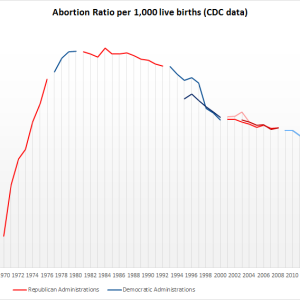Yesterday marked the 44th anniversary of Roe v. Wade, the Supreme Court decision in which abortion was declared to be a Constitutional right. Here are four sobering realities to consider.
Tag: politics
The New Economics
There was a time, not long ago, in which liberals could be counted on to defend the rights of workers, just as conservatives would the rights of business owners. Those days are over. This is the story of how workers (and business owners) were betrayed by our rampant consumerism.
Suffering and the Sanctity of Life: Why We Don’t See Eye-to-Eye on Abortion and Euthanasia
Is it wrong to take an innocent human life if you can do it without inflicting pain? What about if killing the person reduces the amount of pain that they’re in?
In the debates about both assisted suicide and abortion, it’s common to see two incompatible camps emerge. Despite all of the yelling and nastiness between the two sides, there are people in both camps who are trying to do the right thing. Frequently (not always), the problem is that they’ve simply got two incompatible moral codes. One side looks at the reduction/cessation of suffering, while the other side is rooted in a view of the inherent sanctity of human life. So who’s right, and how can we know?
3 Surprising Lessons from Jesus’ Weirdest Parable
The weirdest and most troubling of Jesus’ parables is almost certainly the parable of the dishonest manager in Luke 16, in which Jesus presents a parable of a manager who, upon being fired, exploits his position to cut deals with his master’s clients so that he can try to leverage this into a job with them. Rather than being justly furious, the master *praises him* for his ingenuity.
What on earth is going on? Three things to keep in mind with this parable.
3 Pro-Life Answers to Pro-Choice Arguments
Seth Millstein at Bustle has compiled a list of 11 pro-choice responses to common pro-life arguments. This is my response to his three biggest points: about the life of the unborn child, about whether sex carries with it a responsibility for motherhood, and about whether “rape exceptions” make any sense.
Wait for the Lord: Learning from Judith, Anna and Simeon
In the face of a political and personal future that often seems uncertain or unpleasant, it’s easy to lose heart and to despair of God’s presence in our lives. Fortunately, Scripture presents a radically different message. Here’s what Judith, Simeon and Anna have to show us about aligning our lives to God’s timetable, instead of trusting in secular salvation.
Martin Shkreli and the Crisis of Corporate Conscience
Martin Shkreli has been labelled the “most hated man in America” after his company, Turing Pharmaceuticals, raised the price of their potentially life-saving anti-parasitic drug Daraprim by over 5000%. But if you support the HHS Mandate, you can hardly complain about Turing Pharmaceuticals. You don’t get to spend years harassing Hobby Lobby and the Little Sisters of the Poor for bringing conscience into the marketplace, and then turn around and complain that the markets are amoral.
Do Democratic Presidencies Reduce the Abortion Rate?
A popular progressive political argument is that the only truly pro-life choice is to vote Democratic. After all, the argument goes, even if said Democrats are vocally “pro-choice,” they’re also pro-social net, and the presence of a social net prevents women from feeling like they “need” abortion. During Republican administrations, in contrast. social nets get slashed, pregnant women feel more desperate (and less capable of caring for the children with which they’re pregnant), and abortion goes up. It’s an interesting theory, but is it true?
Martin Luther King, Natural Law Theorist
Dr. Martin Luther King was a natural law theorist. If you misunderstand that part of him, neither he nor the Civil Rights movement make sense. Here’s why.
Are Gay Marriage Opponents “Born This Way”?
One predictive factor in opposition to gay marriage — and even opposition to homosexuals themselves — is genetics. Certain people are more naturally averse to homosexuals and homosexual behavior than others. This means that, if it’s wrong to oppose homosexuality because certain people are “born that way,” then it’s even worse to oppose “homophobia,” since even more people are “born that way,” and the genetic link is stronger.









